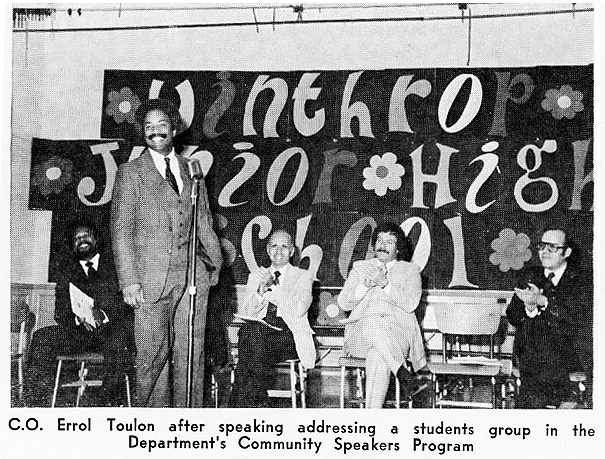
 Above: Image of photo and caption at top of October 1980 DOC newsletter Inside Out Page 2. Below left: Image of the story's headline. Below right: Text of the story starts. |
“You will not get 'juiced' if you are 13 years old and you commit a murder. You would get 25 to life under the new Juvenile Offender Law that went into effect in September, 1978.” “Do the guards still beat up inmates?” “What, no hot water in the cells?” “Where are there conjugal visits?” These are some of the typical questions C.O. Errol Toulon has to answer when he goes to schools to discuss the role the Department of Correction plays in the Criminal Justice System.
C.O. Toulon developed the program’s “City within a City” theme, sent 200 letters to schools advising them of the department’s program which features lectures and slide presentations. Within a week, the responses began pouring in requesting Errol as a speaker. “There is a great deal of concern about disparity in the system,” Errol says, “And the kids want to know why there really isn’t equal justice for all. They ask good questions, bright questions. Sometimes I don’t have an answer for a technical question I am asked. When that happens, I go back to the office, research the answer and send it back to the school. No question went unanswered. I avoided nothing.” The slide presentation enabled Errol to show the inside of a jail, the recreation areas and actual cells. “Television and movies glorify criminals and jail so I told them differently,” he said, “I showed them.” The only time Errol could not use his video equipment was at Lavelle School for the Blind. “It worked out fine,” he says, “I adjusted by making the oral presentation more descriptive.” “Is it really that bad?” the kids ask Errol once he is out in the corridors. “That bad and worse,” he answers. “You know,” he tells the kids, “If you spend one hour or one day in jail, that’s more than you should give your. self. You know why?” And without waiting for an answer he says, “Because you can never get that time back.”
Errol came to the department 17 years ago with a high school diploma. After seven years on the job, he decided it would benefit him to take some psychology courses. This decision led to nine years of night school and four degrees including an M.B.A. “Once I started learning how to deal with people in jail, they related to me as an individual rather than someone in a uniform. It changed things for me• It made a positive difference.”
C.O. Toulon, who is a photographer for the department, will spend the summer improving the lectures, upgrading the video presentation and going over suggestions he receives from educators. He is booked for next September and his goals for “City within a City” is to work with as many schools as possible next year. “Especially the I.S. schools,” he says, “That’s where we can really practice prevention. This soft spoken, literate correction officer with a salt and pepper afro says he has learned a valuable lesson during the past six months. A re-elected member of Community School Board 47, he knows now that he will teach or counsel young people someday. “It was some- thing I never thought about in the past, but this has given me the opportunity to see another side of myself. To do something like this is a once in a lifetime opportunity.” Pausing for a thoughtful moment and with a look of total satis- faction, he said, “Yes, I will finally have a chance to see the fruits of my labor.” |